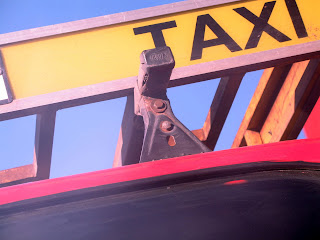 We're stuck in Figuig as of this moment following the language camp because of another transit strike brought on by the introduction of a traffic bill in parliament. Of note from the papers:
We're stuck in Figuig as of this moment following the language camp because of another transit strike brought on by the introduction of a traffic bill in parliament. Of note from the papers:"The bill, which introduces a point-record driving license system, breath analyzing tests and fines up to USD 350, in addition to the incrimination of some infractions especially in serious injuries and death cases, has sparked off much debate in parliament circles as well as the uproar of several transport trade unions, who started, on Monday, a 48-hour strike."And that strike still continues; the bill's future unresolved. If implemented, the point system would allow authorities to take away the license of poor drivers who have been in accidents, fined, etc in rank order. Critics say it will lead to corruption and that it threatens large single income families where the lone breadwinner is a transit driver. From another source,
By slaughter, he's referring to this"Faced with the unavailability of taxis and buses, travellers in both urban and rural areas have been paying exorbitant prices for non approved carriers. According to managers in the key ports of Casablanca and Kenitra, the lack of lorries is delaying the delivery of goods. The prices of vegetables, fruit and basic foodstuffs have risen steadily and many observers feel the situation could worsen over the next few days...
El Bouzid Khallouf, who is in his fifties and owns a lorry, thinks this new law will have to be revised before it can be adopted. "This move to take away drivers’ licences is only likely to encourage even more corruption. We don’t want to be bribing the police and traffic officers to be able to drive around in peace." Yassine, a Casablanca taxi driver, feels that confiscating driving licences poses a real threat to the profession. "Given the mediocre earnings we receive each month, we refuse to be deprived of our licences every now and then for mistakes we rarely, if ever, make...
While waiting for a solution to the conflict, unionists say they are prepared to continue the strike until they get their message across. In their view, the fight against road traffic accidents should be directed not at repressing drivers, but at raising traffic control standards and improving the social and pay conditions for those working in the transport sector.
Transport Minister Karim Ghellab insisted that he will not give in to what he termed as blackmail. He stated that his aim is to make the roads safer by reducing the "slaughter" taking place on Morocco’s highways."
I've always thought the greatest security risk in Morocco is transportation. It seems like the government is trying to reduce that risk, but I can understand where transit workers are coming from. They're stubborn because of the risk associated with change."Morocco is among the worst countries in terms of road safety, as 10 people are killed every day and USD 1.3 billion lost every year.
Last year, road accidents claimed 3,622 lives, i.e. a 4.17% increase compared to 2005. Some 56,426 accidents were recorded during the same period, that is a 5.22% increase compared to the previous year."

No comments:
Post a Comment